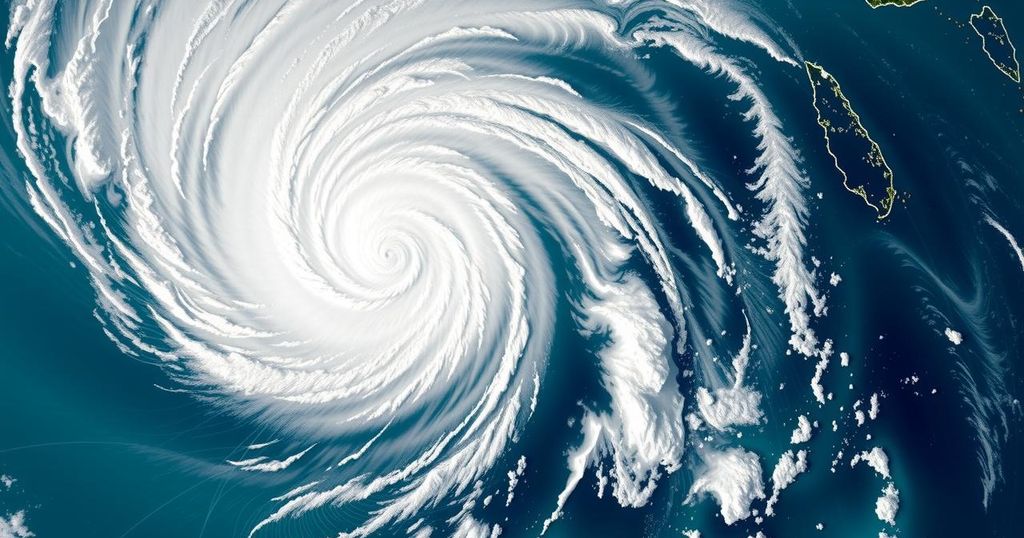Weather
World news
AFRICA, ANA CRISTINA, CHI, CHIDO, CLIMATE CHANGE, DIANA, DISASTER MANAGEMENT, EUROPE, FRANCE, FREDERIC LEGUILLIER, INTERIOR MINISTRY, MAYOTTE, MOZAMBIQUE, MOZAMBIQUE NATIONAL METEOROLOGICAL INSTITUTE, NAMPULA, NATIONAL EMERGENCY OPERATIONS CENTER, NATIONAL WEATHER SERVICE, NATURAL DISASTER, NATURAL DISASTERS, PARIS, RAIN, ZIMBABWE
Maya Ramirez
0 Comments
Cyclone Chido Approaches Indian Ocean Islands, Prompting Emergency Preparations
Cyclone Chido is approaching the Indian Ocean islands of Comoros, Madagascar, and Mayotte, prompting emergency preparations including school closures and evacuations. More than two million people in Mozambique are at risk as the cyclone approaches landfall, with winds expected to exceed 200 kph. Authorities are mobilizing resources and assistance to mitigate the storm’s impact and prevent potential disease outbreaks.
The Indian Ocean islands of Comoros, Madagascar, and Mayotte are preparing for the imminent arrival of Cyclone Chido, which is projected to impact the region severely. Schools in Comoros have been mandated to close as forecasts predict that Chido will reach the islands by early Saturday, after passing the northern region of Madagascar. Mayotte has also been placed on a red alert by the French national weather service, indicating an elevated level of risk as the cyclone approaches.
Further assessments from Mozambique indicate that over two million individuals may face consequences as Chido makes landfall on the African continent, expected by early Sunday. The National Emergency Operations Center of Mozambique has estimated a need for rescue for approximately 2.5 million residents in the Cabo Delgado and Nampula provinces due to estimated wind speeds reaching up to 200 kilometers per hour (124 mph). Even landlocked Zimbabwe anticipates potential impacts from the cyclone.
Madagascar authorities have proactively issued alerts through mobile messages and radio broadcasts, urging residents to take precautionary measures. Several evacuations are underway, especially in the northern Diana region, which is expected to endure the cyclone’s most severe effects, affecting nearly 20,000 lives. In preparation, local authorities have distributed food and emergency relief equipment since Tuesday.
In response to the crisis, the French government is dispatching around 110 personnel to Mayotte, comprising emergency responders and firefighters from Reunion island. They are also sending equipment, including search dogs and rescue specialists, to aid in recovery efforts. The cyclone season lasts from December to March in this region, characterized by an increase in severe cyclones, which have recently been attributed to climate change. Cyclone Chido poses risks for flooding and landslides, with potential outbreaks of waterborne diseases subsequently occurring, reminiscent of past cyclones such as Idai in 2019 which had significant consequences in Mozambique and Zimbabwe.
The Indian Ocean region is known for its cyclone season from December through March, an annual occurrence that has intensified in recent years. Recent cyclones have resulted in a considerable loss of life and significant property damage across various countries, with climate change being cited as a contributing factor to the increased severity of these storms. As Cyclone Chido approaches, governments and organizations are mobilizing resources to safeguard populations and mitigate potential disaster impacts. The proactive approaches, including evacuations, alerts, and resource distribution, reflect a growing recognition of the need for preparedness in the face of natural disasters.
In summary, Cyclone Chido poses a significant threat to Comoros, Madagascar, and Mayotte, with preparations already underway to protect local populations. Schools have been closed, evacuations initiated, and emergency resources mobilized in anticipation of the storm. Mozambique has issued red alerts, highlighting the broad geographical impact and the projected need for rescue operations. The collective efforts of local and international authorities aim to alleviate the impending challenges posed by this cyclone and its aftereffects, including potential disease outbreaks. The situation underscores the ongoing concern about the worsening impacts of climate change on cyclone frequency and intensity in the region.
Original Source: abcnews.go.com




Post Comment